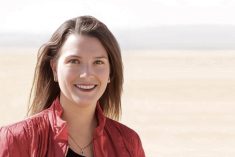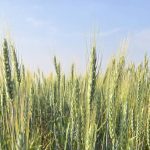When you’re one half of a busy couple running a farm while also raising four young children, there isn’t a lot of time left over. If you’ve got other passions or aspirations, well, they just have to wait.
Except it turns out this isn’t entirely true, as Anne Lazurko was to discover.
Lazurko dreamed of writing. Or, to say it with more precision, there was something in Lazurko that made her identify herself to herself as a writer.
Read Also

Lessons from the past: How Canada can reverse its shrinking share of the global food market
A historic look back at how Canada has positively dealt with trade issues — and how those lessons can inform future moves.
But how was she to become a writer? Or, when you come right to it, how is any farmer supposed to achieve their non-farming dream if it requires so much focus, networking and education?
Somehow, Lazurko didn’t let those concerns take charge. It probably has to do with what we just said — she identified herself as a writer — and she found, every day, that she could squeeze in a few minutes to write.
It took many years, but keeping at it paid off. In 2013, she published her first novel, Dollybird, and last year she followed up with a new novel, What is Written on the Tongue (ECW Press), a story based loosely on her Dutch father’s experiences both in occupied Holland during the Second World War and later in the Indonesian War of Independence.
Lazurko had got a taste for news writing while editing the University of Saskatchewan’s student newspaper, the Sheaf, as she completed a political science degree. After graduating she spent two years as a reporter at a small-town newspaper in Edson, Alta. Her degree, though, landed her a job with the Saskatchewan Wheat Pool as a district representative at Weyburn, working with delegates and local people on political issues.
On Wheat Pool business, Lazurko drove into the yard of her future husband, David, a dairy farmer at the time, and a few years later they were married and started a family, which meant she was adding more identities that would also need her time and energy.
Room for all of them
“I became a mom and a dairy farmer, and the writing went to the side for awhile,” she says. “Life is strange. I didn’t know anything about dairy farms and never would have dreamed that that would have been something I would do.”
But Lazurko threw herself wholeheartedly into learning the dairy business, although she still felt a tug to return to the writing career she had shelved.
“The dairy wasn’t my choice of career, it was David’s, but you do what you have got to do to make a living, so I learned how to do everything on the farm alongside raising four children,” she says.
After 15 years dairying, the couple opted to sell the cows and for the past 18 years they have been grain farmers, growing canola, lentils, and spring and durum wheat. As the children grew, Lazurko also went back to writing.
“I didn’t go back to the journalism right away, I actually started doing some creative work,” she says. “I had some poetry published and I worked on short stories. I’ve been a member of the Saskatchewan Writers’ Guild for 30 years, so I took a lot of workshops, went to their events and got to know other writers in the community. I always felt maybe they were wondering what I was doing there because I wasn’t getting much published. I knew that didn’t stop me being a writer, but in my mind, I was just sort of hovering.”
Mentors and training
Although she continued to work on the farm, Lazurko decided it was time to get more serious about her parallel career. Through the guild, she found mentor Connie Gault, a fellow Saskatchewan novelist and playwright.
“She helped give me confidence in my writing, and I began to think maybe I could get more pieces published,” Lazurko says.
From that experience she began writing a short story, keeping at it until it became a novel. With a full draft of Dollybird in hand she took an eight-month creative writing course via correspondence through Humber College, which helped her take her writing to the next level.
She also got back into journalistic writing, beginning with community and business profiles for Saskatchewan Business Magazine, and evolving, logically, given her farming background, into writing for Country Guide and Grainews.
When Dollybird hit the bookstores, Lazurko was finally a published novelist. But that didn’t magically transform her in the eyes of her family. As much as she wanted to devote more time to her writing, she was still first and foremost a farmer and mom, and the farm didn’t take a backseat to her writing ambitions.
“After Dollybird came out, the family and my husband were happy, and proud, but even at that point for the farm it was like the writing was the sideline,” she says. “I also fit the journalistic writing in between the spaces wherever I could, which wasn’t easy. And for a very long time, what I really wanted to do was to pursue both those things in a real, full way.”
Creating space for writing
Throughout her farming career and while raising her family, Lazurko tried hard to create space for her writing, sometimes successfully, sometimes not. Over time, as the children got older and then left home, and the farm could afford to hire some help when needed, she made more and more space for her writing until she was finally able to say, “I want (to) and can write full-time.”
“I had been renting a little place in town for $100 a month that was freezing cold in the winter and blazing hot in the summer, but it was my little space, for working alone,” she says.
“Then, we had all this space at home, so we converted one of the bedrooms upstairs into my office. I think it’s true for many women trying to create their own thing on the farm, to have either a different career or a parallel career, that they have to prioritize it.
“Often with men and farming, the farm comes first no matter what. And in my mind, I started to think, no, it doesn’t have to come first for me. And it doesn’t have to. You end up doing a lot of the kid-raising, and especially with a dairy, all of your time is taken by the farm and things outside yourself.
“If that’s your choice that’s great, but at some point, I thought, it’s not really my choice and I need to do what I need to do. So, I did more and more writing, still in the spaces between farming work but then eventually, after Dollybird had come out, and I’d had some success with it, I really wanted to work on this new novel and I stepped back from the farm.”

Lazurko admits there were some heavy discussions around that idea.
“The thing about farming with each other is that when you get into that groove, you’re very good at it,” she says. “You anticipate what has to happen, you trust each other with how things are going to go in the field, with the bookkeeping or whatever it is. You are always available,” she laughs. “Which is not necessarily a good thing.”
Dedicating more of her time to her writing meant David had to make adjustments that were hard at first.
“It was not because he took me for granted, but it required an adjustment in terms of his management style because it had been just the two of us for the most part,” she says. “He hired seasonal help and made small adjustments like putting the attachments on the back of the seed cart to pull the half-ton out in the field instead of having me running back and forth to fill up. There wasn’t any resentment; it was just more like ahhhh, you know?”
Sticking to your guns
Lazurko believes that both women and men need to try and find time for themselves and the things important to them as they progress through their farming careers.
“If there was something I’d encourage my younger self and others to do it would be to create space for things that are important to them outside the farm, and that’s true of both partners in the operation,” Lazurko says.
“The farm is all-consuming but I’m not sure it’s healthy to let it be, and it’s important to find that outlet and make time and space for it without constantly justifying it. It’s important for all kinds of reasons related to your relationships but also your attitude toward the farm itself.”
After many years of juggling her two parallel careers, Lazurko is enjoying doing what she loves and what, if the reviews and awards are anything to go by, she is good at. Lazurko has won many awards and accolades for her journalistic writing, and Dollybird won the WILLA Award for Historical Fiction. What is Written on the Tongue has received glowing reviews, including from Lawrence Hill, writer of the bestselling Book of Negroes and The Illegal.
She’s glad that she persisted with writing, hard though it was at times, and her best advice for someone busy trying to farm and pursue a parallel career is to be organized, and even at times when the farm needs surpass all else, to remind yourself that you will at some point have time for yourself.
“Some things take precedence. Cows have to be fed. The combine has to run late because rain is in the forecast. But I can take things a little more in stride with the writing now because I know I’ll get back to it,” she says. “There is always something that’s going to come up kid-wise or farm-wise I suspect, but I know I will get there eventually because somehow, I always have.”
In the end, too, even the hard parts turned out good for her writing career.
“When I look back, I was efficient as a writer when I was pressed for time, because that time was so precious to my writing that I used it very well,” she says. “It did take me 10 years to write Dollybird, but I had four kids and was just fitting it in, and even taking courses as well. I don’t know how I did that. But I think there’s a certain efficiency of time, and even an efficiency of language within the writing, that comes from all of that.
“What is Written on the Tongue”
Anne Lazurko’s new novel, What is Written on the Tongue, is loosely based on the experiences of her Dutch father who, shortly after returning to Holland from forced labour in Germany during the Second World War, was conscripted to fight for control of the Dutch colony of Indonesia. Here is a brief excerpt:
Doors of warehouses yawn open, while families living upstairs emerge to sit on balconies overlooking the sewage-filled canals. Closer to the port, men scramble up three-meter stacks of rope layered in different sizes and braids and colors, heave down coils thick as a woman’s thigh and twenty meters long, while others sort through pillars of sky-blue barrels used to take fish to market. The long prows of the Bugis pinisi boats angle across the pier as though stacked. At one, fishermen run up and down a narrow log propped against the hull, balancing nets and rope, barrels and gear they load onto the ship. Finally they jump in, throwing off the ties as they land.
“Hari baik,” Sam calls to the watching crew and waves. They wave back, laughing and hollering something he can’t make out. The ship makes its way out from the jumble of boats, hits open water and unfurls its seven sails to begin the run to Madura, or north across the Java Sea to Kalimantan, or east to Flores. He wants to go along and see these exotic places, the orangutan and Komodo dragons he’s heard about, the pygmies and Dayak people. But those aren’t the exploits he was signed up for.
Holland had never conscripted soldiers to the East Indies. Not in two hundred years. Not until now. Lucky him. At the office in Roermond, he’d signed the papers as instructed, told by a weakeyed private that the tropics would be the adventure of a lifetime. But the Nazis had provided more than enough adventure. When he finally made it home from where he was forced to work in Germany, he’d wanted only to go back to school and date his girl, Petra. And he hated to leave his sisters to listen to their father’s rage. Marie and Anika and himself, all of them wrung out by war and grief and all they could never understand.
Excerpted and adapted from What is Written on the Tongue by Anne Lazurko. © 2022 by Anne Lazurko. All rights reserved. Published by ECW Press Ltd. ecwpress.com
















